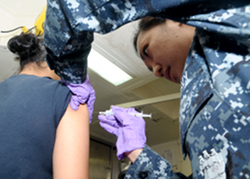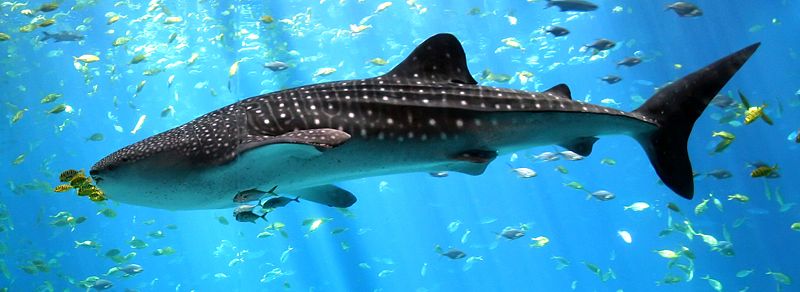News in a nutshell
| 24 January, 2011 | Adie Chan |
|

|
This week’s news includes an ongoing debate about cholera vaccination in Haiti, two misconduct updates, the loss of a stem cell pioneer, a possible new test for Alzheimer’s disease, a new report on treating genetic disorders in utero, and a peculiar marine mammal meal.
Controversial cholera plan

Authorities are divided over a proposed mass cholera vaccination program in Haiti. The World Health Organization, along with the Centers for Disease Control and Prevention (CDC) and others, is recommending a pilot immunization program to distribute 250,000–300,000 doses of a cholera vaccine to Haitians, according to Nature. But Jean Ronald Cadet, vaccination program manager for the Haitian ministry of health, argues that vaccination should begin with at least 1 million doses, with the goal of eventually vaccinating 6 million people. Others disagree: “I would prefer this money be used to improve water-supply networks and to reinforce sanitation activities,” epidemiologist Renaud Piarroux of the University of the Mediterranean in Marseilles, France, told Nature.
The cholera epidemic has killed nearly 4,000 people in Haiti since the outbreak began in October, the Associated Press reports.
Misconduct updates
A Japanese virologist, Naoki Mori, has been dismissed from his job at the University of the Ryukyus in Nishihara, Okinawa, following numerous retractions due to problems with images, according to ScienceInsider. Over the last year, Mori and co-authors had five papers retracted from the journal Infection and Immunity, three from the Journal of Virology, two from Blood and one from Retrovirology. The initial retractions were reported in December on Retraction Watch. Mori is appealing his dismissal, claiming the inaccuracies were confined to the images depicting control data and that the experimental data “were portrayed entirely accurately,” he told ScienceInsider.
Last May, University of Washington (UW) School of Medicine researcher Andrew Aprikyan was fired for misconduct after a seven year investigation stemming from errors identified in digital images of a paper he published in Blood. Now, an off-campus UW blog says the UW Senate issued a report, accessible only by UW staff, saying that the administration violated Aprikyan’s rights to due process during the misconduct case.
Stem cell pioneer dies
Ernest McCulloch, a Canadian stem cell pioneer who proved the existence of stem cells, died on Wednesday, January 19 at the age of 84. McCulloch, together with partner James Till, created the first method for identifying stem cells in mice in 1963. In 2005, the duo received the Albert Lasker Award for Basic Medical Research, and in 2009, the two Canadians were nominated for the Nobel Prize but did not win.
“I feel a strong sense of loss,” Till told AFP in an email. “Dr McCulloch was a trusted and creative colleague, and a supportive and steadfast friend.”
New test for Alzheimer’s — good or bad?
A new brain scan that tests for the amyloid plaques of Alzheimer’s disease is being hailed by some as “a monumental step forward” despite an FDA advisory board rejection of the manufacturer’s new drug application. The board did, however, say they would recommend approval if the company can show that the scans are read consistently by different doctors, ScienceInsider reports.
Mom’s stem cells to treat baby?
A mother’s stem cells could be used to treat genetic disease of her baby before birth, according to new research from the University of California, San Francisco. Past efforts at in utero blood stem cell transplantation to treat genetic diseases such as sickle cell anemia and some immune disorders have failed, despite the fact that the developing fetus’s immature immune system shouldn’t be capable of rejecting the transplant. Now, in a mouse study published in the February issue of The Journal of Clinical Investigation, researchers show that the mother’s immune system is to blame for rejecting foreign stem cells, and that simply transplanting stem cells from the mother overcomes the rejection response. “We now, for the first time, have a viable strategy for treating congenital stem cell disorders before birth,” said paper author Tippi MacKenzie, an assistant professor of pediatric surgery at UCSF, in a press release.
Whale vs. shark

Killer whales, it turns out, enjoy dining on sharks, but pay a high price for doing so. Researchers at the Pacific Biological Station in Nanaimo, British Columbia, have identified a population of orcas in the northeastern Pacific that regularly eat shark, but due to their prey’s tough skin, the whale’s teeth are worn down to the gum.
“It may be that the young whales have to do most of the work,” senior author John Ford told Nature. “The older ones are probably just gumming away at the liver.” The results are reported in this month’s issue of Aquatic Biology.
Correction (January 24): The original version of this story incorrectly referred to Nature as Nature News. The Scientist regrets the error.
Related stories:
[21st September 2010]
[24th May 2010]
[22nd March 2010]

|


Dear Editor,
Thank you for the item “Misconduct updates” and I wish you to maintain it as a regular feature.
Common people believe in a “MYTH” that so called “SCIENTISTS” are a special kind of beings who never cheat and some pseudo-scientists try to take advantage of this for their personal gains which ultimately misleads many.
“Misconduct updates”, I hope, will keep a check on all concerned.
Thanks.
Dr. J. Sil